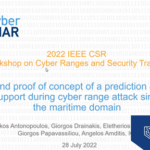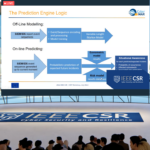

2022 IEEE CSR Workshop on Cyber Ranges and Security Training (CRST)
August 1, 2022 @ 8:00 am - 5:00 pm

Cyber-attacks are increasing in both sophistication and scale, revealing the extent at which critical infrastructures and other information and communication systems are exposed. More highly skilled cyber security professionals are needed with a deep understanding of cyber-security to deal with the fast growing number of cyber-threats. Cyber-security education and training are becoming more and more relevant as it is the only way in which such incidents can be prevented and handled adequately. A cyber-range (CR) is the environment in which cyber-security experts and professionals can practice technical and soft skills and be trained —in an isolated virtual environment emulating large-scale complex networks— on how to respond to cyber-attack scenarios within various domains. The more realistic the simulated scenarios, the more prepared the trainees will be to face real-world attacks.
The cyber-space offered by the CR infrastructure recreates the experience of responding to a cyber-attack, by replicating a security operations center environment, an organization’s network and the attack itself. CRs are considered to be the key towards strengthening the robustness and security of critical infrastructures; therefore, it is important that they provide a realistic, diverse, and dynamic simulation environment so as to properly prepare trainees for preventing and responding to all incidents of cyber-attacks. This is an area in which further advancements should be made: the generated scenarios are tightly coupled with the domain being modelled, often not easily modifiable to accommodate changes in an organization’s infrastructure or software and likewise not easily extendable to acquire knowledge regarding newly discovered vulnerabilities, threats and attackers’ tactics, techniques, and procedures. In the era of IoT, these limitations do not allow easy prevention, detection, and mitigation of hybrid attacks spanning many different domains.
2022 IEEE CSR Workshop on Cyber Ranges and Security Training (CRST) focused on both research and practical aspects of cyber ranges and aims at addressing the main challenges involved in their development and use in professional cyber security training, as well as in exploring the use of emerging technologies. Aligned with the interdisciplinary nature of cyber security, authors from academia, industry, and government were welcome to contribute.
Cyber-MAR coordinating team, ICCS, submitted and presented a technical paper entitled ‘Design and proof of concept of a prediction engine for decision support during cyber range attack simulations in the maritime domain‘.
Paper can be found here.
Presentation of the paper can be found here.




